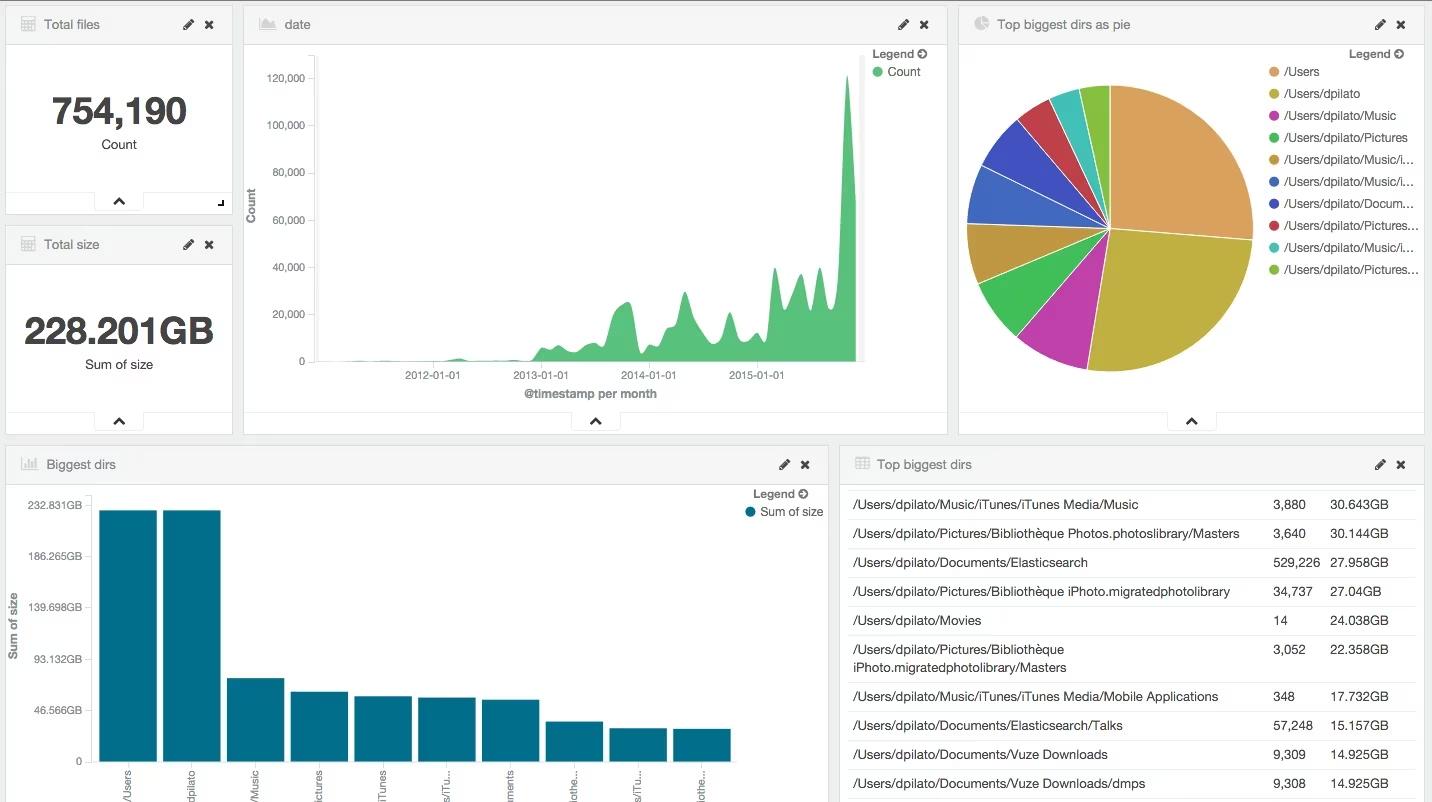
I gave a BBL talk
recently and while chatting with attendees, one of them told me a simple use case he covered with elasticsearch: indexing metadata files on a NAS with a simple ls -lR like command.
His need is to be able to search on a NAS for files when a user wants to restore a deleted file.
As you can imagine a search engine is super helpful when you have hundreds of millions files!
I found this idea great and this is by the way why I love speaking at conferences or in companies: you always get great ideas when you listen to others!
I decided then to adapt this idea using the ELK stack.
Find the command line
As I’m running on MacOS, I need to install first coreutils
as I’m missing one cool parameter to the ls command: --time-style.
brew install coreutils
I’m starting with find and ls which offers here a nice way to display our filesystem from a given directory, ~/Documents here.
find ~/Documents -type f -print0 | xargs -0 gls -l --time-style="+%Y-%m-%dT%H:%M:%S"
This gives something like:
-rw-r--r-- 1 dpilato staff 6148 2014-09-18T12:49:23 /Users/dpilato/Documents/Elasticsearch/tmp/es/.DS_Store
-rw-r--r-- 1 dpilato staff 110831 2013-01-28T08:47:27 /Users/dpilato/Documents/Elasticsearch/tmp/es/docs/Autoentreprise2012.pdf
-rw-r--r-- 1 dpilato staff 145244 2013-01-15T14:47:28 /Users/dpilato/Documents/Elasticsearch/tmp/es/meetups/Meetup.pdf
-rw-r--r-- 1 dpilato staff 11 2015-05-12T16:34:08 /Users/dpilato/Documents/Elasticsearch/tmp/es/test.txt
Parse with logstash
Let’s create a nice JSON document with logstash.
Analyze current format
What is the format we have? Each line has two main parts separated by a space:
- metadata:
-rw-r--r-- 1 dpilato staff 11 2015-05-12T16:34:08 - fullpath:
/Users/dpilato/Documents/Elasticsearch/tmp/es/test.txt
metadata contains:
dif path is a directory or-if file. We only print files so we have only-.rwxuser rights:rfor read,wfor write andxfor executionr-xgroup rights: same format as for user rightsr-xother rights: same format as for user rights- a blank
1: number of links- a blank
dpilato: user name- a blank
staff: group name- a blank
11: file size. The text length depends on the biggest file we will find.- a blank
2015-05-12T16:34:08: last modification date.
Grok it
I’m using GROK Constructor to incrementally build the grok pattern.
I’m ending up with:
[d-][r-][w-][x-][r-][w-][x-][r-][w-][x-] %{INT} %{USERNAME} %{USERNAME} %{SPACE}%{NUMBER} %{TIMESTAMP_ISO8601} %{GREEDYDATA}
Translating to logstash grok filter and setting field names, it gives:
(?:d|-)(?<permission.user.read>[r-])(?<permission.user.write>[w-])(?<permission.user.execute>[x-])(?<permission.group.read>[r-])(?<permission.group.write>[w-])(?<permission.group.execute>[x-])(?<permission.other.read>[r-])(?<permission.other.write>[w-])(?<permission.other.execute>[x-]) %{INT:links:int} %{USERNAME:user} %{USERNAME:group} %{SPACE}%{NUMBER:size:int} %{TIMESTAMP_ISO8601:date} %{GREEDYDATA:name}
Let’s test it!
I create a file treemap.conf:
input { stdin {} }
filter {
grok {
match => { "message" => "(?:d|-)(?<permission.user.read>[r-])(?<permission.user.write>[w-])(?<permission.user.execute>[x-])(?<permission.group.read>[r-])(?<permission.group.write>[w-])(?<permission.group.execute>[x-])(?<permission.other.read>[r-])(?<permission.other.write>[w-])(?<permission.other.execute>[x-]) %{INT:links:int} %{USERNAME:user} %{USERNAME:group} %{SPACE}%{NUMBER:size:int} %{TIMESTAMP_ISO8601:date} %{GREEDYDATA:name}" }
}
}
output { stdout { codec => rubydebug } }
Then I launch logstash:
find ~/Documents -type f -print0 | xargs -0 gls -l --time-style="+%Y-%m-%dT%H:%M:%S" | bin/logstash -f treemap.conf
It gives for the same line we discussed before:
"message" => "-rw-r--r-- 1 dpilato staff 11 2015-05-12T16:34:08 /Users/dpilato/Documents/Elasticsearch/tmp/es/test.txt",
"@version" => "1",
"@timestamp" => "2015-12-11T11:27:06.386Z",
"host" => "MacBook-Air-de-David.local",
"permission.user.read" => "r",
"permission.user.write" => "w",
"permission.user.execute" => "-",
"permission.group.read" => "r",
"permission.group.write" => "-",
"permission.group.execute" => "-",
"permission.other.read" => "r",
"permission.other.write" => "-",
"permission.other.execute" => "-",
"links" => 1,
"user" => "dpilato",
"group" => "staff",
"size" => 11,
"date" => "2015-05-12T16:34:08",
"name" => " /Users/dpilato/Documents/Elasticsearch/tmp/es/test.txt"
When I try to write permission properties to nested fields, I hit an issue . So I need to add some transformations.
Fix permissions
As seen before, we want to write permissions to a nested data structure. We can use the mutate filter .
First, let’s replace rwx values to true and - to false:
mutate {
gsub => [
"permission.user.read", "r", "true",
"permission.user.read", "-", "false",
"permission.user.write", "w", "true",
"permission.user.write", "-", "false",
"permission.user.execute", "x", "true",
"permission.user.execute", "-", "false",
"permission.group.read", "r", "true",
"permission.group.read", "-", "false",
"permission.group.write", "w", "true",
"permission.group.write", "-", "false",
"permission.group.execute", "x", "true",
"permission.group.execute", "-", "false",
"permission.other.read", "r", "true",
"permission.other.read", "-", "false",
"permission.other.write", "w", "true",
"permission.other.write", "-", "false",
"permission.other.execute", "x", "true",
"permission.other.execute", "-", "false"
]
}
It now gives:
"permission.user.read" => "true",
"permission.user.write" => "true",
"permission.user.execute" => "false",
"permission.group.read" => "true",
"permission.group.write" => "false",
"permission.group.execute" => "false",
"permission.other.read" => "true",
"permission.other.write" => "false",
"permission.other.execute" => "false",
We can mutate again those fields as actual booleans:
mutate {
rename => { "permission.user.read" => "[permission][user][read]" }
rename => { "permission.user.write" => "[permission][user][write]" }
rename => { "permission.user.execute" => "[permission][user][execute]" }
rename => { "permission.group.read" => "[permission][group][read]" }
rename => { "permission.group.write" => "[permission][group][write]" }
rename => { "permission.group.execute" => "[permission][group][execute]" }
rename => { "permission.other.read" => "[permission][other][read]" }
rename => { "permission.other.write" => "[permission][other][write]" }
rename => { "permission.other.execute" => "[permission][other][execute]" }
}
It now gives:
"permission" => {
"user" => {
"read" => "true",
"write" => "true",
"execute" => "false"
},
"group" => {
"read" => "true",
"write" => "false",
"execute" => "false"
},
"other" => {
"read" => "true",
"write" => "false",
"execute" => "false"
}
}
Let’s now move to booleans. We can add that to the same latest mutate filter we just added:
convert => { "[permission][user][read]" => "boolean" }
convert => { "[permission][user][write]" => "boolean" }
convert => { "[permission][user][execute]" => "boolean" }
convert => { "[permission][group][read]" => "boolean" }
convert => { "[permission][group][write]" => "boolean" }
convert => { "[permission][group][execute]" => "boolean" }
convert => { "[permission][other][read]" => "boolean" }
convert => { "[permission][other][write]" => "boolean" }
convert => { "[permission][other][execute]" => "boolean" }
Et voilà!
"permission" => {
"user" => {
"read" => true,
"write" => true,
"execute" => false
},
"group" => {
"read" => true,
"write" => false,
"execute" => false
},
"other" => {
"read" => true,
"write" => false,
"execute" => false
}
}
Date reconciliation
We have 2 fields related to a timestamp:
"@timestamp" => "2015-12-11T11:27:06.386Z",
"date" => "2015-05-12T16:34:08"
The date filter
will reconciliate the @timestamp field with the file date.
date {
match => [ "date", "ISO8601" ]
remove_field => [ "date" ]
}
Timestamp is now correct:
"@timestamp" => "2013-01-15T13:47:28.000Z",
Cleanup
Some fields are now not needed anymore so we can simply remove them by adding a remove_field directive to our mutate filter:
remove_field => [ "message", "host", "@version" ]
We are now all set to send the final data to elasticsearch!
{
"@timestamp" => "2015-05-12T14:34:08.000Z",
"links" => 1,
"user" => "dpilato",
"group" => "staff",
"size" => 11,
"name" => "/Users/dpilato/Documents/Elasticsearch/tmp/es/test.txt",
"permission" => {
"user" => {
"read" => true,
"write" => true,
"execute" => false
},
"group" => {
"read" => true,
"write" => false,
"execute" => false
},
"other" => {
"read" => true,
"write" => false,
"execute" => false
}
}
}
Send to elasticsearch
As usual we just have to connect the elasticsearch output :
elasticsearch {
index => "treemap-%{+YYYY.MM}"
document_type => "file"
}
Use a template
Actually, we don’t want elasticsearch decide for us what the mapping would be. So let’s use a template and pass it to logstash:
elasticsearch {
index => "treemap-%{+YYYY.MM}"
document_type => "file"
template => "treemap-template.json"
template_name => "treemap"
}
Index settings
In treemap-template.json, we will define the following index settings:
"index" : {
"refresh_interval" : "5s",
"number_of_shards" : 1,
"number_of_replicas" : 0
}
Path Analyzer
Also, we need a path tokenizer to analyze the fullpath, so we define an analyzer in index settings:
"analysis": {
"analyzer": {
"path-analyzer": {
"type": "custom",
"tokenizer": "path-tokenizer"
}
},
"tokenizer": {
"path-tokenizer": {
"type": "path_hierarchy"
}
}
}
Mapping
Let’s disable the _all feature .
"_all": {
"enabled": false
}
Also, we don’t analyze string fields but for name field, we use our path-analyzer:
"name" : {
"type" : "string",
"analyzer": "path-analyzer"
}
Kibana
While I’m creating some visualizations, I’m also launching the full injection:
find ~/Documents -type f -print0 | xargs -0 gls -l --time-style="+%Y-%m-%dT%H:%M:%S" | bin/logstash -f treemap.conf
find ~/Applications -type f -print0 | xargs -0 gls -l --time-style="+%Y-%m-%dT%H:%M:%S" | bin/logstash -f treemap.conf
find ~/Desktop -type f -print0 | xargs -0 gls -l --time-style="+%Y-%m-%dT%H:%M:%S" | bin/logstash -f treemap.conf
find ~/Downloads -type f -print0 | xargs -0 gls -l --time-style="+%Y-%m-%dT%H:%M:%S" | bin/logstash -f treemap.conf
find ~/Dropbox -type f -print0 | xargs -0 gls -l --time-style="+%Y-%m-%dT%H:%M:%S" | bin/logstash -f treemap.conf
find ~/Movies -type f -print0 | xargs -0 gls -l --time-style="+%Y-%m-%dT%H:%M:%S" | bin/logstash -f treemap.conf
find ~/Music -type f -print0 | xargs -0 gls -l --time-style="+%Y-%m-%dT%H:%M:%S" | bin/logstash -f treemap.conf
find ~/Pictures -type f -print0 | xargs -0 gls -l --time-style="+%Y-%m-%dT%H:%M:%S" | bin/logstash -f treemap.conf
find ~/Public -type f -print0 | xargs -0 gls -l --time-style="+%Y-%m-%dT%H:%M:%S" | bin/logstash -f treemap.conf
And finally, I can build my visualization…

My hard disk
Please don’t tell to my boss that I have more music files than work files (in term of disk space)! :D
Complete files
For the record (in case you want to replay all that)…
Logstash
treemap.conf file:
input { stdin {} }
filter {
grok {
match => { "message" => "(?:d|-)(?<permission.user.read>[r-])(?<permission.user.write>[w-])(?<permission.user.execute>[x-])(?<permission.group.read>[r-])(?<permission.group.write>[w-])(?<permission.group.execute>[x-])(?<permission.other.read>[r-])(?<permission.other.write>[w-])(?<permission.other.execute>[x-]) %{INT:links:int} %{USERNAME:user} %{USERNAME:group} %{SPACE}%{NUMBER:size:int} %{TIMESTAMP_ISO8601:date} %{GREEDYDATA:name}" }
}
mutate {
gsub => [
"permission.user.read", "r", "true",
"permission.user.read", "-", "false",
"permission.user.write", "w", "true",
"permission.user.write", "-", "false",
"permission.user.execute", "x", "true",
"permission.user.execute", "-", "false",
"permission.group.read", "r", "true",
"permission.group.read", "-", "false",
"permission.group.write", "w", "true",
"permission.group.write", "-", "false",
"permission.group.execute", "x", "true",
"permission.group.execute", "-", "false",
"permission.other.read", "r", "true",
"permission.other.read", "-", "false",
"permission.other.write", "w", "true",
"permission.other.write", "-", "false",
"permission.other.execute", "x", "true",
"permission.other.execute", "-", "false"
]
}
mutate {
rename => { "permission.user.read" => "[permission][user][read]" }
rename => { "permission.user.write" => "[permission][user][write]" }
rename => { "permission.user.execute" => "[permission][user][execute]" }
rename => { "permission.group.read" => "[permission][group][read]" }
rename => { "permission.group.write" => "[permission][group][write]" }
rename => { "permission.group.execute" => "[permission][group][execute]" }
rename => { "permission.other.read" => "[permission][other][read]" }
rename => { "permission.other.write" => "[permission][other][write]" }
rename => { "permission.other.execute" => "[permission][other][execute]" }
convert => { "[permission][user][read]" => "boolean" }
convert => { "[permission][user][write]" => "boolean" }
convert => { "[permission][user][execute]" => "boolean" }
convert => { "[permission][group][read]" => "boolean" }
convert => { "[permission][group][write]" => "boolean" }
convert => { "[permission][group][execute]" => "boolean" }
convert => { "[permission][other][read]" => "boolean" }
convert => { "[permission][other][write]" => "boolean" }
convert => { "[permission][other][execute]" => "boolean" }
remove_field => [ "message", "host", "@version" ]
}
date {
match => [ "date", "ISO8601" ]
remove_field => [ "date" ]
}
}
output {
stdout { codec => dots }
elasticsearch {
index => "treemap-%{+YYYY.MM}"
document_type => "file"
template => "treemap-template.json"
template_name => "treemap"
}
}
Template
treemap-template.json file:
{
"order" : 0,
"template" : "treemap-*",
"settings" : {
"index" : {
"refresh_interval" : "5s",
"number_of_shards" : 1,
"number_of_replicas" : 0
},
"analysis": {
"analyzer": {
"path-analyzer": {
"type": "custom",
"tokenizer": "path-tokenizer"
}
},
"tokenizer": {
"path-tokenizer": {
"type": "path_hierarchy"
}
}
}
},
"mappings" : {
"file" : {
"_all": {
"enabled": false
},
"properties" : {
"@timestamp" : {
"type" : "date",
"format" : "strict_date_optional_time||epoch_millis"
},
"group" : {
"type" : "string",
"index": "not_analyzed"
},
"links" : {
"type" : "long"
},
"name" : {
"type" : "string",
"analyzer": "path-analyzer"
},
"permission" : {
"properties" : {
"group" : {
"properties" : {
"execute" : {
"type" : "boolean"
},
"read" : {
"type" : "boolean"
},
"write" : {
"type" : "boolean"
}
}
},
"other" : {
"properties" : {
"execute" : {
"type" : "boolean"
},
"read" : {
"type" : "boolean"
},
"write" : {
"type" : "boolean"
}
}
},
"user" : {
"properties" : {
"execute" : {
"type" : "boolean"
},
"read" : {
"type" : "boolean"
},
"write" : {
"type" : "boolean"
}
}
}
}
},
"size" : {
"type" : "long"
},
"user" : {
"type" : "string",
"index": "not_analyzed"
}
}
}
},
"aliases" : {
"files" : {}
}
}
